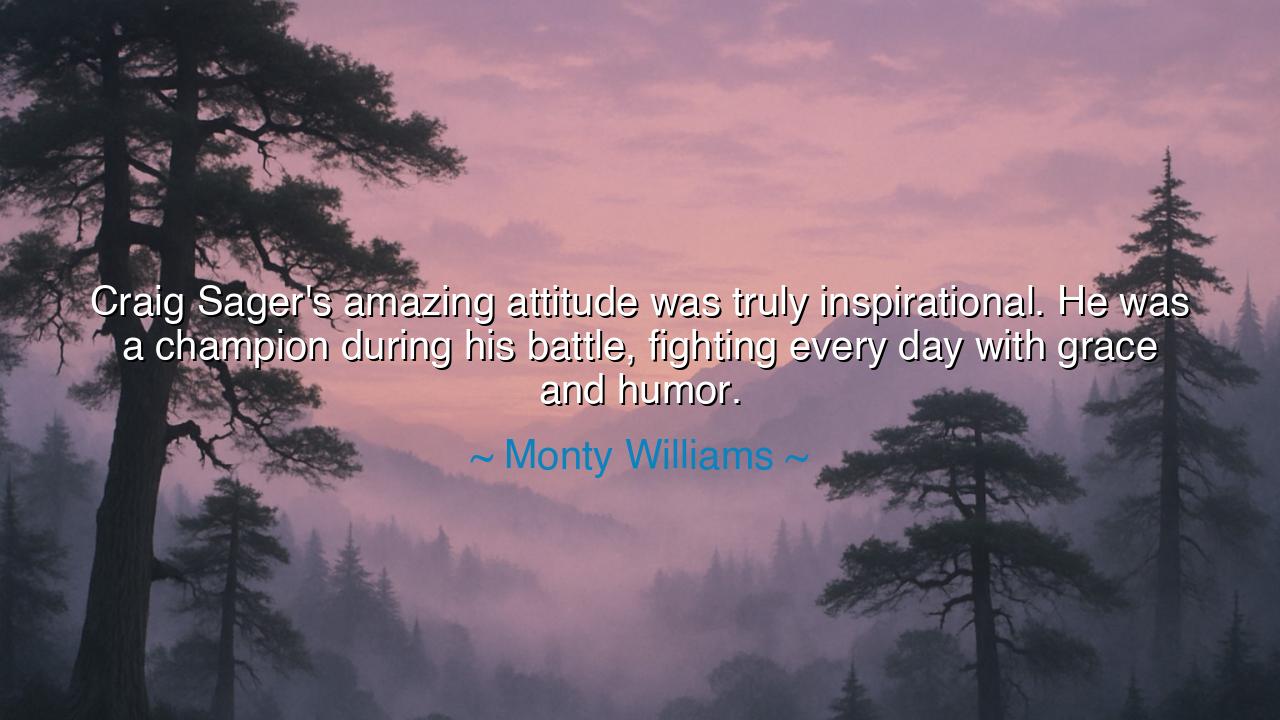
Craig Sager's amazing attitude was truly inspirational. He was a
Craig Sager's amazing attitude was truly inspirational. He was a champion during his battle, fighting every day with grace and humor.






In the reverent words of Monty Williams, a man of faith and resilience himself, we hear a timeless truth about courage and the indomitable human spirit: “Craig Sager’s amazing attitude was truly inspirational. He was a champion during his battle, fighting every day with grace and humor.” Though spoken in honor of one man, these words reach far beyond the life of Craig Sager, for they speak of the rare strength found in those who face suffering not with despair, but with dignity, laughter, and light. They remind us that true heroism is not found in conquest or achievement, but in the spirit with which one endures the storms of life.
The origin of this quote lies in the passing of Craig Sager, the beloved American sports broadcaster known for his colorful suits and even more colorful spirit. When illness came to claim him — a fierce form of leukemia that would test his body and soul — he did not yield to bitterness. Instead, he met each day as he had met the world throughout his life: with humor, optimism, and joy. Even as his body weakened, his will remained radiant. When Monty Williams called him “a champion during his battle,” he spoke not of victory over disease, but of triumph over fear. For in the ancient wisdom of the Stoics and the saints, the one who keeps his peace amidst suffering is greater than the one who conquers cities.
Sager’s life embodied a truth that the ancients knew well — that grace in suffering is the highest form of strength. His laughter, his brightness, his refusal to let darkness dictate his spirit, turned his final years into a testament for all who watched. Like a warrior smiling on the battlefield, he taught that courage is not the absence of pain, but the presence of joy despite it. The ancient philosopher Epictetus, who himself endured slavery and hardship, once said: “It is not what happens to you, but how you react to it that matters.” In this, Sager stood among the wise — for he transformed his trial into a light for others to follow.
Consider too the story of Nelson Mandela, who spent twenty-seven years in prison and emerged not with anger, but with forgiveness. Like Sager, Mandela’s grace turned his suffering into strength, and his endurance became a flame that lit nations. Such examples reveal the same universal truth: that the measure of a life is not its comfort, but its character. Monty Williams’s words honor this lineage of quiet heroes — those who, when faced with the inevitable, choose not to crumble, but to shine.
When Monty speaks of “grace and humor”, he points to something divine. Grace is the gentleness of the soul under pressure — the calm acceptance that life, though unpredictable, is still beautiful. Humor is the human soul’s rebellion against despair, a way of saying, “I may suffer, but I will not surrender my joy.” Together, they form the twin shields of resilience. Craig Sager wielded both, not as weapons against fate, but as gifts to those who witnessed him. Even in hospital gowns, even through the trials of chemotherapy, he appeared before cameras in bright suits — symbols of defiance and hope, reminders that the light within cannot be dimmed by the darkness outside.
Monty Williams himself knew this truth intimately. He had faced his own grief, the tragic loss of his wife, and spoke with the same grace that he admired in Sager. His recognition of Sager’s “amazing attitude” was not casual praise — it was the acknowledgment of a kindred spirit, a man who understood that faith and fortitude are the soul’s greatest triumphs. In honoring Sager, Monty was also teaching the world: that courage does not always roar. Sometimes it smiles, even when tears are near. Sometimes it tells jokes in hospital rooms, wears bright colors to funerals, and keeps believing in beauty, even in the shadow of death.
Let this, then, be the lesson for all who hear these words: live your life with such spirit that even your hardships become a source of inspiration. When pain comes, meet it not with bitterness, but with grace. When fear rises, answer it with humor and light. Remember that others are watching — children, friends, strangers — and your strength may awaken strength in them. For in the theater of human existence, we are each both audience and actor; how we face our trials becomes the story others will carry forward.
And so, dear listener, remember the wisdom born from Monty Williams’s tribute and Craig Sager’s life: the true champion is not the one who escapes suffering, but the one who meets it with an open heart. To live joyfully in the face of pain is the rarest and highest form of victory. Walk, then, through your own struggles as Sager did — not shrouded in fear, but clothed in courage, radiant with humor, and alive with grace. For when you do, you too will become a light to others, and your spirit, like his, will remain forever inspirational.






AAdministratorAdministrator
Welcome, honored guests. Please leave a comment, we will respond soon